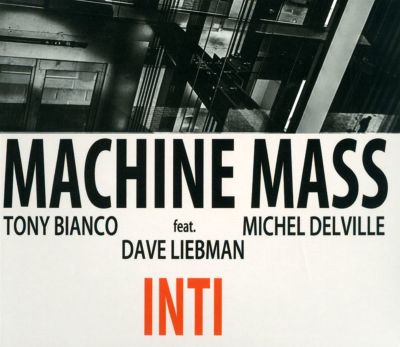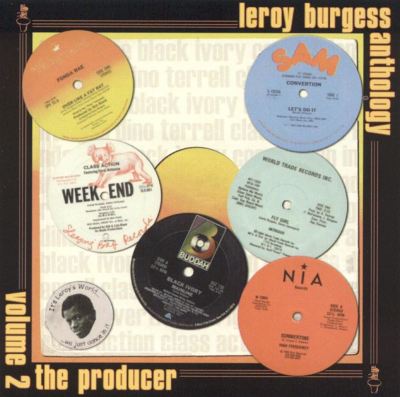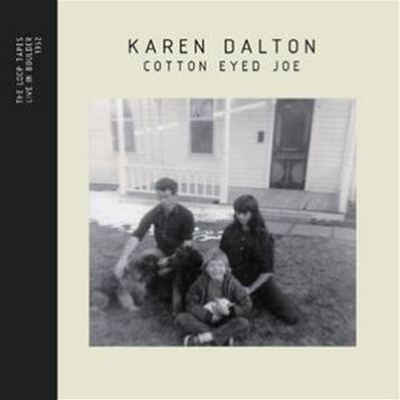Staff Picks for November 2014
November 30, 2014
Even careful listeners might be forgiven for presuming this live-in-the-studio recording features saxophonist Dave Liebman in a freewheeling electric jazz quintet with guitar, bass, keyboards, and drums. Wrong. Only drummer Tony Bianco and guitarist Michel Delville join Lieb in the Machine Mass trio here, but their mastery of looping and electronics tricks the ears into hearing something larger. And with some of Bianco's bass loops extending past 100 bars in length, don't expect to hear any rigid repetitiveness, either.
November 29, 2014
Though their earliest phases saw the band in a (relatively) more lighthearted phase, Dread broke the band through into the world of tormented noise and horror show anxieties they'd explore for years to come. Brutal electronics from newest member John Olson cemented the album into Throbbing Gristle-by-way-of-Whitehouse territory and they never looked back after that.
November 28, 2014
Though His Name is Alive's shapeshifting slowed down in the 2000s, it still yielded potent results. Here, the band brings together all the seemingly loose threads of its career—indie-pop, shoegaze, blues-rock, folk, gamelan—and throws in some Afro-pop and noisy electronics for good measure. In many other groups' hands this many musical ideas might simply be too much, but Xmmer is surprisingly cohesive and captivating, particularly on the charming closer "Come to Me."
November 27, 2014
Songwriter, producer, instrumentalist, and singer Leroy Burgess recorded under an array of aliases and often worked behind the scenes. Those in the know rightly identify him as the king of boogie—soul-rooted, post-disco R&B. This traces back to Black Ivory's towering '79 disco single and collects several '80s gems he made as/with Convertion, Fonda Rae, and Class Action, among others. Volume one is essential as well.
November 26, 2014
While the vocals of Stephen Mallinder are absent, Plasticity kicks off a trio of high caliber Cabaret Voltaire efforts with Richard H. Kirk in charge. Best of the bunch are the opening weapons lesson called "Low Cool", plus "Soul Vine [70 Billion People]", a techno redo of the synth-pop duo's early hit "Yashar".
November 25, 2014
Matthew Sweet's follow-up to his breakthrough album Girlfriend took the prickly pop tone of that LP and moved it into darker and more forbidding territory. Altered Beast is a study of one man's obsessions, including unbalanced relationships, sexual hunger, spiritual doubt, and unanswered questions, all filtered through tough but hooky tunes fueled by brilliant guitar work from Robert Quine and Richard Lloyd, as well as occasional detours into country rock. Brooding but brilliant, Altered Beast puzzled Sweet's new fans in 1993, but years later it sounds like one of his best and bravest works.
November 24, 2014
Sleek, sordid, and sexy, yet musically classy and radio-ready enough to fool unsuspecting grocery/department store shoppers into inadvertently shaking their hips in time whilst consuming, Godfrapp's sugary pop and fat-synth-laden second long player (and it's even racier follow-up Supernature) demands both insubordination and submission.
November 23, 2014
During Faith No More's lengthy hiatus, the closest Mike Patton came to that band's pop sensibility was with Tomahawk. The supergroup's debut embraced big hooks, memorable riffs and fairly traditional song structures, along with the requisite Patton vocal freakouts and nightmare vision lyrics. Songs like "Sweet Smell of Success" (plus album-wide lyrical references to the noir classic of the same name) and "God Hates a Coward" are home runs, but still got the band booed offstage nightly on a subsequent tour with Tool.
November 22, 2014
Tall, beautiful, and haunted by hard drugs and alcohol, a situation that left her homeless and nearly toothless at her death in New York in 1993, Karen Dalton never found commercial success in her lifetime, but her extremely small recording legacy, just two albums, and now this double-disc live set from 1962, reveals a maverick and singular musician utterly unlike anyone else on the folk (or any other) scene. Dalton's approach isn't for everyone, and this is far from an album to throw on at a party -- the barely veiled emotional power of these vocal performances is much more likely to produce a stunned silence than any kind of levity. The really good news is that this two-disc package now doubles the amount of Karen Dalton recordings available in the world.
November 21, 2014
Years before there was chatter about the term alternative R&B, 4hero made this alternately sparkling and fiery fusion of Charles Stepney's chamber soul, the Mizell brothers' jazz-funk, and the duo's own broken-beat science. Despite a turn from Jill Scott, this didn't stand a chance on the States' homogenized airwaves. Too few niche-program DJs knew it went down easy beside singles from rising talents like Bilal and Alicia Keys, and established stars like Erykah Badu and Maxwell.
November 20, 2014
Following a three year layoff that saw the departure of frontman Ian McCulloch and the tragic death of drummer Peter DeFreitas, the Bunnymen dared to carry on with the surprisingly solid Reverberation. Fighting an uphill battle, new frontman Noel Burke turned in some strong material that went largely unheard by fans who couldn't accept a McCulloch-less version of the band. This sadly overlooked release would be his only turn at the helm.
November 19, 2014
Various Artists
This new Bear Family series-which is currently slated to run seven volumes and conclude in the mid-'70s-may not be much in the way of obscurities or revelations but where it excels is context. This double-disc set and its single disc companion outline the first explosion of Cosmic American Music, hitting Gram Parsons hard but also threading in such unsung popular pioneers as the Monkees and Lovin' Spoonful, which help make this instructive and entertaining.
November 18, 2014
Piero Umiliani wrote, produced and arranged this soundtrack for Franco Rossi's 1962 film. The composer's excellent jazz orchestra shines, especially buoyed by fantastic performances from vocalist Helen Merrill and trumpeter Chet Baker.
November 17, 2014
The third collection of mellifluous Hammond organ and brush-driven percussion-led instrumentals from spellcasting Swedes Eric Malmberg and Ulf Möller, Allt Hänger Samman, which translates to "everything is connected," offers eleven largely ambient and evocative retro-pop fugues in search of the next Wes Anderson film.
November 16, 2014
Following up the smoky electro of 2007's Night Drive, Kill For Love took the Chromatics' disco darkness even furthur into the abyss. Hypnotic, near-endless grooves, classic vintage drum machine and synth sounds stretch around spare song skeletons to create an unshakable mood of night time desperation.
November 15, 2014
Presented by producer Andrew Loog Oldham of Rolling Stones fame, this live album is arguably overly mixed by purists standards, but the stately performances cut through all that audience sweetening real quick. Filled with enough hits to get a "Best of" in the title, this comes from the reggae singer's Harder They Come era, so consider it crucial.
November 14, 2014
Brooklyn-based heavy psych band Naam is calling it quits following one last show this weekend after five years, two full-lengths, two EPs and a seven-inch of Nirvana covers. On their 2009 debut LP, the band established its template of stoned grooves, haulin' ass riffs and bursts of speed, indebted equally to prog, grunge, European psychedelia and American stoner rock, powered by thick bass tones, reverb-washed vocals and pummeling (when appropriate) drums.
November 13, 2014
The band's politics can be simplistic and their ideals somewhat murky at times, but if you need an outlet for frustration, you could do worse than screaming along to "Know Your Rights." Sure, the rest of the record is fine, sometimes even brilliant, but really just play "Rights" five or six times in a row at top volume and maybe you'll be able to summon the energy and drive to wade through another day of oppressive politics and despair. Good luck with that!
November 12, 2014
On this 2013 Clean Feed label outing, Canadian-born pianist Kris Davis displays her multifaceted skills as a composer and improviser while drawing the best from her quintet members—some of the finest players on the Brooklyn avant jazz scene—as they collectively shift from intuitive, chamberesque interplay into climaxes of spirited energy and focused precision. A fine album of uncommon depth, and a measure of Davis' continuing growth as a key innovator in the 21st century creative jazz world.
November 11, 2014
Primarily known for his avant-garde, often introspective jazz, the late-Canadian trumpeter took a more straight-ahead approach on this still adventurous date. Backed by Gary Williamson on a Fender Rhodes and featuring a handful of modal post-bop compositions, Wheeler dove headlong into Freddie Hubbard/Woody Shaw territory.
November 10, 2014
Mary Timony may be having a bit of a renaissance right now, but Seana Carmody was the other female rocker from Boston in the 90s that had a medieval-shoegaze bend to her songs. "All Over The Land," is Syrup USA's only album produced after Carmody left her previous band, The Swirlies. The record is a sugary, yet dense and synth heavy affair, that that would fit well stacked between your Stereolab and Helium LPs.
November 9, 2014
Various Artists
What happens when folks with no musical skill write lyrics and invite hack tunesmiths to match them to melodies for a modest fee? You get disco numbers about Jimmy Carter, tributes to the color yellow, rhymeless paens to roses, angry rants about nameless nemeses, and neo-beatnik meditations on percussion, all accompanied by cookie cutter melodies as curious as the words. A splendid introduction to the strange and remarkable nether-world of song-poem recordings, and a wildly entertaining study of what lurks in the mind of the harmless eccentric next door.
November 8, 2014
The singer's first 20th century album, following short stops at ABC and Motown, was a timely and brilliant disco makeover fostered by cross-genre geniuses James Mtume and Reggie Lucas. In 2011, the album was reissued as part of Feel the Fire: The 20th Century Collection, and it was also given a separate release. Both feature the essential 12" versions of the singles.
November 7, 2014
Brooklyn-born George "Smoke" Dawson was an itinerant musician all of his life. He played banjo and fiddle in the old-time Appalachian string band style, and he developed a fascination for bagpipes as well, all of which made him a distinctive street musician and busker. He recorded one album of solo Appalachian fiddle tunes, simply called Fiddle, in 1971, and his playing throughout, while wild and primitive, brings new and interesting shadings to these old mountain classics without diminishing their traditional shape.
November 6, 2014
The first installment of a trilogy of albums inspired by classic movies, The Lady from Shanghai found a revitalized Pere Ubu "fixing" dance music for their own purposes. Wrapping relentless beats in a decidedly noir ambience, these songs show the band still taps into paranoia, loathing, and the downright weird with a distinctive eloquence.
November 5, 2014
The tasty sophomore long-player from the unpredictable San Francisco-based collective led by Tony Award-winning pop polymath Mark Stewart (Stew), Joys & Concerns is a spicy, hook-filled horn of plenty that pairs paisley-blasted jangle pop with overcast Bay Area soul.
November 4, 2014
While his hyperkinetic early work is characterized by an air of irreverence and irony, Dan Deacon transformed his style into something altogether more majestic with America. Partly inspired by a cross-country train ride, the album captures a sense of sweeping grandeur with its pairings of pulsing, off-kilter rhythms and orchestral movements, making the album a bold and engrossing artistic statement from the electronic auteur.
November 3, 2014
In the 1970s and 1980s Ahmad Jamal made records that employed more Fender Rhodes than acoustic piano. Though jazz funk fans loved them, purists didn't. Here the pianist doubles on Rhodes and his grand with bassist Larry Ball, drummer Herlin Riley, and percussionist Iraj Lashkaryl. They offer muscular readings of some of his classics ("Poinciana"), as well as stripped down version of "One," Wayne Shorter's "Footprints," and "Theme from M*A*S*H."
November 2, 2014
The second album after the Chili Peppers' prodigal son made his returns to both his old band and the world of the living, this record is as down to earth as he gets. From the driving opener "Carvel" to the experimental and enveloping "Failure33 Object," or the sincere, six-word "Regret" and jaunty "This Cold," it's a tremendously engaging listen for an artist with such an eccentric reputation. Josh Klinghoffer, who would later take his place in the Chili Peppers, serves as his right-hand man.
November 1, 2014
Starting out as a bristling chapter in the first wave of British punk, the Clash's development from the raw outbursts of their first two records into the eclecticism and spirit of 1979's London Calling was unprecedented, to say the least. A double album where almost all of the 19 songs are brilliant and touched with both political rage and tenderness, it raised the bar for everything that came after it and still stands as one of the most interesting, inspired rock records ever made.












![Smog [Original Motion Picture Soundtrack]](https://fastly-s3.allmusic.com/release/mr0004184649/front/400/3HB8gMMvLEqC9hYr6yxBNj6KsMttLlyBmmVTZ6_CLs0=.jpg)
















